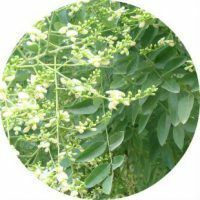
Japanese Sophora( or Japanese rhinoceros) is a medicinal tree of the legume family that grows in Japan, China, Central Asia, Transcaucasia, and the Crimea. From unblown buds, flowers and ripe fruits, plants produce drugs that help in the treatment of many diseases. However, there are certain contraindications to their use, with the ignoring of which the state of health can significantly worsen.
- composition and therapeutic properties
- Flavonoids
- glycosides
- Alkaloids
- Trace
- Application
- Contraindications
- Side effects
- during pregnancy
composition and therapeutic properties
Japanese Sophora is rich in nutrients, it is composed of:
to contents ^Flavonoids
Rutin, quercetin, kaempferol, genistein, which are part of sophora, have the following effect:
- Normalize the permeability of capillaries and prevent their fragility.
- Reduces blood viscosity.
- Promote the effective absorption of vitamin C( ascorbic acid).
- Reduces the burden on the heart, preventing heart disease.
- Neutralize free radicals, have antioxidant properties, speeding up the process of tissue regeneration.
- Relieve inflammation.
- Fight viral infections.
- Have radioprotective properties and are used in courses of radio-beam and chemical therapy.
Glycosides
- Have a positive effect on heart function.
- Expand the vessels.
- Calms the nervous system.
- Improves the excretion of urine.
- Dilute and excrete sputum during bronchitis.
Alkaloids
Pachycarpin and matrices have the following properties:
- Decrease vascular tone.
- Reduce blood pressure.
Microelements
Flowers and seeds of Sophora in large quantities contain:
- Potassium.
- Magnesium.
- Calcium.
- Iron.
- Iodine.
- Bor.
- Zinc.
- Fatty oils.
- Organic acids.
Application of the
Japanese Sophora has a wide range of action, it can be used in such forms:
- Alcohol tincture - because of the poor solubility of Sophora in water is the most effective means for ingestion. To prepare the preparation, you need to pour 100 milliliters of vodka with 20 grams of flowers and put it in a dark place for 10 days. Strain and take 1 teaspoon 3 times a day after meals.
- Water broth - 2 tablespoons of a mixture of flowers and plant fruits pour 0.5 liters of boiling water, boil for 5 minutes and cool. The strained remedy can be used as a therapeutic tea, make with it the appliqués, add to the bath.
- Powder - represents dry flowers of Sophora, ground in a coffee grinder, which can be used as a food additive or added to cosmetic preparations.
- Ointment - the finished product is sold in the pharmacy and serves to rub into the skin 2-4 times a day.
- Oil - has a pronounced effect of softening and healing of the skin, and is also used in the form of nasal drops to treat the common cold. It is used as an independent agent or as part of other drugs( cream, tonic, face and body lotion).
The use of funds inside, as well as their external application, are effective in the following diseases:
- Diabetes mellitus( sophora lowers blood glucose and cholesterol levels).
- . Oncological diseases.
- Radiation sickness. Endocrine disorders( goiter).
- Pathologies of the cardiovascular system( varicose veins, atherosclerosis, hemorrhoids, hypertension, angina pectoris, rheumatism, stroke).
- Hemorrhages( both external and internal).
- Diseases of the gastrointestinal tract( ulcers, gastritis, colitis).
- Lesion of the liver( pancreatitis, hepatitis).
- Disturbance of the kidney and urogenital system.
- Impotence, prostate adenoma.
- Gynecological pathologies in women( inflammation, erosion, vaginitis, neoplasms of various types).
- Mastitis, cracked nipples of mammary glands.
- Diseases of the respiratory tract( runny nose, tonsillitis, bronchitis, pneumonia, tuberculosis).
- Lesion of the eye( barley, conjunctivitis, retinal hemorrhage).
- Diseases of the mouth( gingivitis, periodontitis, periodontitis).
- Burns, frostbite, wounds( including purulent), abscesses, trophic ulcers.
- Skin diseases( acne, furunculosis, dryness, allergic reactions, dermatitis, psoriasis).
- Fungal lesions of the extremities.
- Infection with parasites( helminthiases).
- Hair loss. Insomnia, neurosis, loss of appetite.
Contraindications
Restrictions on the use of Japanese Sophores are:
- Individual intolerance to the components of the drug( allergy to a family of legumes or alcohol is possible).
- Serious liver and kidney problems.
- Hypotension - under reduced pressure, the drug can only be used as one of the components of the herbal collection.
- Activities that require increased concentration of attention( the plant has a depressant effect on the nervous system).
- Age under 6 years.
- Pregnancy and lactation.
Side effects of
Do not forget that the fruits of Sophora are poisonous, so you must carefully observe the dosage of the drugs. Intoxication of the body can have the following manifestations:
- Nausea, vomiting.
- Bloating, diarrhea.
- Allergic reactions to the skin( redness, rash, itching).
When pregnancy
Take Japanese Japanese during childbearing with caution, following certain rules:
- In the first trimester, the use of the plant is strictly prohibited - the routine included in its composition stimulates muscle tone, which can lead to miscarriage.
- In case of violations of the liver or kidneys of a pregnant woman, sophora should be discarded.
- The medication and its dosage must be agreed with the attending physician.
